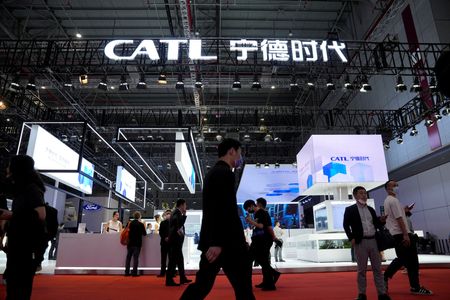BEIJING (Reuters) -China’s CATL, the world’s largest battery maker for electric vehicles (EV), said on Thursday that third-quarter profit rose 10.7%, its weakest quarter since the start of last year as slowing demand and stiff competition hit.
This compared with a 63.2% increase in second-quarter profit and a 188.4% surge in the third quarter of 2022.
CATL saw its China market share tumble in September to the lowest in more than a year, data showed, underscoring the challenges it faces from smaller rivals and weakening demand in the world’s largest electric vehicle market.
It said its net earnings for the third quarter totalled 10.4 billion yuan ($1.42 billion), a 10.7% increase from a year earlier. It was the weakest quarter of growth since the first quarter of 2022 when earnings dropped 23.6%.
“CATL is facing pressure in the near term, given competition from tier-2 battery makers who price their products at a discount to CATL, and weaker-than-expected lithium-ion battery demand,” Citi analysts said in a note.
“This… is an incentive for CATL to offer some price cuts to secure its market share.”
CATL’s market share by battery installations in China-made EVs dropped to 39% in September, the lowest since June last year and down from 45% three months earlier, data from the China Automotive Battery Innovation Alliance (CABIA) showed, as rivals accelerated supplies.
Second-ranked BYD and third-placed CALB both boosted their shipments in China by more than 71% in the first nine months of this year, far outpacing CATL’s 18.8% growth, according to the data.
CATL’s weaker earnings growth also comes amid weakening EV sales in China that stoked an intense price war among automakers and subsequent pressure on battery firms and other suppliers to cut costs.
China’s EV battery installation volume grew 32% in the first nine months of this year, cooling from a 38% gain in the first half and roughly one-third of growth for the same period in 2022, CABIA data showed.
In a sign of challenges from outside its home turf, CATL’s partner Ford Motor said last month that it has paused work on a $3.5 billion EV battery plant in Michigan amid growing concerns by U.S. politicians that it could facilitate the flow of U.S. EV tax subsidies to China.
Shares in Shenzhen-listed CATL have dropped about 16% so far this year, lagging a 8.7% drop in the broader market.
($1 = 7.3155 Chinese yuan renminbi)
(Reporting by Qiaoyi Li, Zhang Yan and Brenda Goh; Editing by Miyoung Kim, Miral Fahmy and Susan Fenton)


